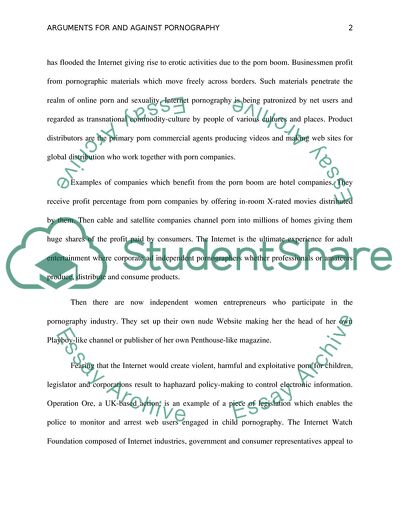
- Home
- Free Samples
- Premium Essays
- Editing Services
- Extra Tools
- Essay Writing Help
- About Us
- Studentshare
- Subjects
- Visual Arts & Film Studies
- Arguments for and against Pornography
Arguments for and against Pornography - Essay Example

- Subject: Visual Arts & Film Studies
- Type: Essay
- Level: Masters
- Pages: 6 (1500 words)
- Downloads: 0
- Author: katharina20
Extract of sample "Arguments for and against Pornography"
They set up their own nude Website making her the head of her own Playboy-like channel or publisher of her own Penthouse-like magazine. Fearing that the Internet would create violent, harmful and exploitative porn for children, legislator and corporations result to haphazard policy-making to control electronic information. Operation Ore, a UK-based action, is an example of a piece of legislation which enables the police to monitor and arrest web users engaged in child pornography. The Internet Watch Foundation composed of Internet industries, government and consumer representatives appeal to web users to report on illegal traffic.
The Foundation encourages citizens to interact with policies to become autonomous governing bodies to use a centralized and user-friendly web site. The Foundation’s goal is to minimize having illegal Internet content, child abuse images in particular. There’s a moral outrage in the USA when nude minors were shown within the gay and lesbian networks. But such depictions are tolerated in other cultures such as Japan. What is obscene to western audiences maybe common in Japanese media; although urination and masturbation scenes are obscene for a western viewer, the most troubling acts for them involve scenes depicting interplay between male minors.
Censorship measures and scenes of conflict between web users and Internet Service Providers of ISP’s forced the local government the most stringent measures of censorship legislation. An example is the Western Australian Censorship Act of 1996. It was created to protect local state territory from the influx of hard-core pornographic materials. Objectionable articles transferred into Western Australian territory through online communication are being reported by Australian citizens. A member of the police force or an authorized person can enter a place where “objectionable” articles are being exhibited even without a warrant.
The Child Online Protection Act (COPA) is a bill which states that the Internet automatically exposes children to pornographic materials. A debate between US Attorney General John Ashcroft and the ACLU (American Civil Liberties Union) was about whether community standards of decency can be transferred from place to place. ACLU argues that the most conservative community standards would apply to the entire nation through a federal censorship law. Ashcroft’s idea is that community standards for minors being different from adults are likely to be “reasonably constant” throughout the nation.
The Society for the Scientific Study of Sexuality and the Institute for the Scientific Study of Sexuality have researchers who found out that there is no sufficient evidence that children are harmed by exposure to sexually explicit words or images. The 1998 Child Internet Protection Act (CIPA) states that computers must be filtered if the public libraries want to retain federal funding. But the current filtering software according to Judith Krug of the American Library Association is still defective.
According to here, instead of relying on software to help them; children and teenagers must be advised on the various uses of the Internet. Judith Levine authored the controversial book Harmful to Minors; The Perils of Protecting Children from Sex, where she argues that obscenity standard in the US since 1968 is being revamped by the government so sexuality debates will be phased out rather than promoting tolerance and education. Instead of exposing children to censored versions of the Internet, they should be taught about media literacy and moral intelligence.
This is Krug and Levine’s idea so children will have a chance to be exposed to the sexual world where adults saturate it with images of love and sex which are varied accurate and realistic (Jacobs). “Let’s Put Pornography Back in the Closet” is Susan Brownmiller’s essay. She aims to take pornography out of the essential freedoms being protected by the First Amendment as provided by the Bill of Rights.
Read MoreCHECK THESE SAMPLES OF Arguments for and against Pornography
Pornography: A sexual pleasure or sexual exploitation of women
Pornography criminalization
Pornography and Gender Inequality
Pro-Porn Feminist View of a Career in Pornography
The creation and consumption of Pornography objectifies women
Online Pornography Is/Isn't Harmful
What Are the Arguments for and Against the Censorship of Pornography

- TERMS & CONDITIONS
- PRIVACY POLICY
- COOKIES POLICY